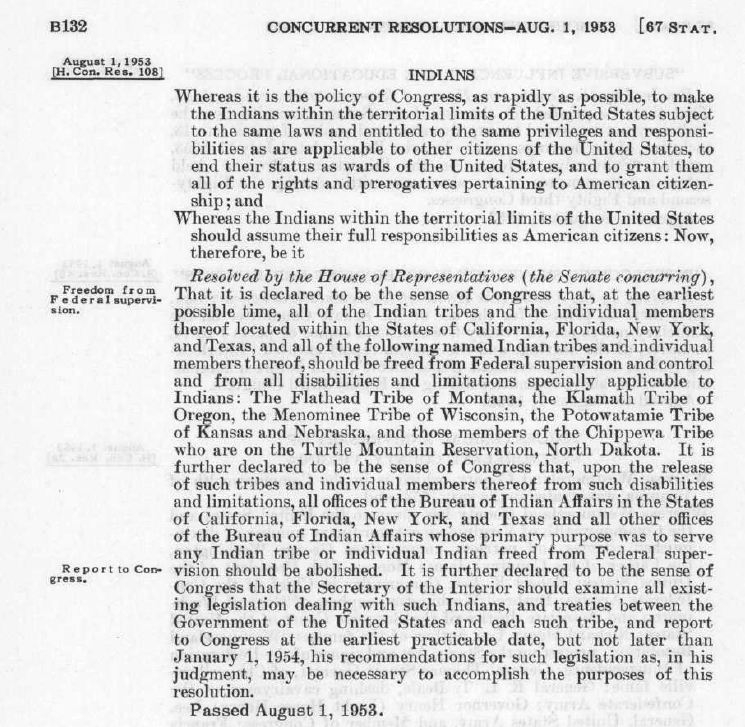
Bureau of Indian Affairs Records: Termination
Termination was a U.S. government policy aimed at ending federal supervision over American Indian tribes.
The National Archives houses multiple series of records related to termination in Record Group 75: Records of the Bureau of Indian Affairs (BIA). These records include correspondence, office files, and minutes.
Historical Overview
Officially announced on August 1, 1953, in House Concurrent Resolution 108 (67 Stat. B132), termination was expressly intended to “make Indians within the territorial limits of the United States subject to the same laws and entitled to the same privileges and responsibilities as are applicable to other citizens of the United States, to end their status as wards of the United States, and to grant them all of the rights and prerogatives pertaining to American citizenship.” This was despite the fact that American Indians had been U.S. citizens since Congress passed the Indian Citizenship Act in 1924 (43 Stat. 253).
Termination was a departure from federal Indian policy in the 1930s and early 1940s, during which time the U.S. government ceased allotting tribal reservations and emphasized tribal self-government instead. Termination ended federal recognition of affected tribes and the federal aid and services that came with that recognition. It also ended federal trust status for affected reservations and the protections granted by such status. In many cases, termination meant the transfer of federal jurisdiction over criminal and civil matters on reservations to state authorities as well.
House Concurrent Resolution 108 called for termination “at the earliest possible time” of all American Indian tribes in California, Florida, New York, and Texas, as well as termination for specific tribes in other states, including “the Flathead Tribe of Montana, the Klamath Tribe of Oregon, the Menominee Tribe of Wisconsin, the Potowatamie Tribe of Kansas and Nebraska, and those members of the Chippewa Tribe who are on the Turtle Mountain Reservation, North Dakota.” This resolution was swiftly followed by Public Law 280 (67 Stat. 588), enacted on August 15, 1953, which conferred jurisdiction over criminal offenses and civil cases arising on most Indian reservations within California, Minnesota, Nebraska, Oregon, and Wisconsin to state authorities.
From 1953 until 1970, Congress initiated 60 separate termination proceedings against American Indian tribes, and over three million acres of tribal lands were relinquished as a result. Although the Nixon administration repudiated termination in 1970 and shifted federal Indian policy toward self-determination, the effect of termination was nevertheless devastating for many tribes.
Records Overview
BIA records related to termination are housed at different National Archives research facilities, depending on the BIA office that maintained the records. Select series are listed below.
Select the National Archives Identifiers for the full archival records descriptions in the National Archives Catalog. For questions related to the records, please contact the custodial unit indicated.
For more information about BIA records, see Navigating Record Group 75. For a full list of National Archives research facilities, see Visit Us.
National Archives in Washington, DC (Archives 1)
For questions related to these records, please email archives1reference@nara.gov.
- “Central Classified Files, 1940–1957” (National Archives Identifier 1719104)
- Termination-related files can be found under different decimal numbers, depending on the specific subject of the file. Researchers may want to start by checking decimals 011 (Acts of Congress), 013 (Proposed Legislation), and 077 (Termination/Withdrawal of Federal Services) for the relevant BIA jurisdiction.
- See Central Classified Files for more information about these records.
- “Central Classified Files, 1958–1975” (National Archives Identifier 1719105)
- Termination-related files can be found under different decimal numbers, depending on the specific subject of the file. Researchers may want to start by checking decimals 011 (Acts of Congress), 013 (Proposed Legislation), and 077 (Termination/Withdrawal of Federal Services) for the relevant BIA jurisdiction.
- See Central Classified Files for more information about these records.
-
“Files for Terminated Tribes of the Klamath Agency and Menominee Agency, 1938–1961” (National Archives Identifier 2123870)
- “Records Concerning Vocational Training for Terminal Tribes and Apprenticeship Policy Materials, 1954–1958” (National Archives Identifier 2194639)
- Tribes covered in this series include the Alabama and Coushatta of Texas, the Klamath, the Menominee, and the Paiute and Uintah and Ouray of Utah.
National Archives at Chicago
For questions related to these records, please email chicago.archives@nara.gov.
- Menominee Agency:
National Archives at Fort Worth
For questions related to these records, please email ftworth.archives@nara.gov.
- Anadarko Area Office:
- “Correspondence Relating to the Alabama-Coushatta Reservation, 1928–1956” (National Archives Identifier 649526)
- Five Civilized Tribes Agency:
National Archives at Kansas City
For questions related to these records, please email kansascity.archives@nara.gov.
- Winnebago Agency:
National Archives at Riverside
For questions related to these records, please email riverside.archives@nara.gov.
- Phoenix Area Office:
- “Records Relating to the Ute Partition and Termination Act, 1954–1972” (National Archives Identifier 12296610)
National Archives at Seattle
For questions related to these records, please email seattle.archives@nara.gov.
- Klamath Indian Agency:
- “Records Relating to Termination, 1954–1959” (National Archives Identifier 4662656)
- “Records Compiled to Assess the Impact of Termination, 1947–1957” (National Archives Identifier 593547)
- “Records Relating to Allotted Land Sales Prior to Termination, 1952–1959” (National Archives Identifier 4662561)
- Portland Area Office:
- “Desk Files of the Assistant Area Director for Community Services Relating to the Termination of the Klamath Tribe, 1953–1959” (National Archives Identifier 1271524)
- “Desk Files of the Assistant Area Director for Resources Relating to the Termination of the Klamath Tribe, 1951–1961” (National Archives Identifier 1271520)
- “Records of the Assistant Area Director Related to the Termination of Western Oregon Tribes, 1954–1960” (National Archives Identifier 1271447)
